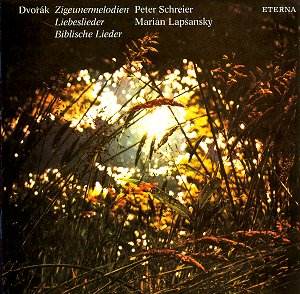Before the collapse of the East German communist
government in 1989 a number of high quality LP recordings were
issued on the VEB Deutsche Schallplatten label, the DDR’s state-run
record company. The majority of these remained behind the Berlin
Wall. (I recall visits to the GDR when I would queue to buy the
latest releases from a Leipzig store). Berlin Classics is now
reissuing some of this historical archive on silver discs, and
this 1983 recital by the outstanding tenor Peter Schreier Zigeunermelodien
fully justifies the project.
Dvořák, who
composed in almost all musical genres, wrote about two hundred
songs of which these three cycles are representative. The Brahmsian
and Wagnerian influences found in Dvořák’s orchestral music
are muted in the songs, which rely on his gift of melody and rhythmic
subtlety. Schreier is in excellent voice throughout
and the recording quality stands up well to the ever-present risks
of CD transfer. However some careful work with the controls may
be necessary to limit occasional stridency.
It is worth listening to the three cycles as
a complete entity in order to compare the versatility and inventiveness
inherent in each. Marián Lapšanský’s sensitive accompaniment
adds to the charms of this set. In Czechoslovakia the gypsies
came to symbolise social and cultural independence, and when an
anthology of gypsy melodies by Adolf Heyduk was published in 1859
Dvořák chose the words of seven
of them to set to music in the German language. The Zigeunermelodien
are undoubtedly ‘art songs’ and no effort is made to highlight
their folkloristic origins. No. 4, Als die alte Mutter mich
noch lehrte singen, will be better known here in its English
translation, Songs my mother taught me, and there are other
gems to discover.
The Liebeslieder cycle owes nothing to
the Brahms work with the same title. They are closer to the German
Lied and, one is tempted to add, to Schubert, though Dvořák’s
Slav accent comes through clearly and there is no hint of pastiche.
They were written for a genuine, living beloved and have an intimate
tenderness both charming and convincing.
The Biblical Songs,
a neglected part of Dvořák’s vocal output., are in
many ways the most revealing. Here the composer looks with a gentle,
enquiring calm into a personal crisis that turned him towards
religious thoughts and their expression, more as affirmations
of simple piety than public declarations of religious belief.
A clue to the shifting tonality of several of these songs (which
anticipates Mahler’s later songs with orchestra) may exist in
No. 5, Herr, mein Gott, ich sing ein neues Lied (Lord my
God, I sing a new song). Anyone who could not find interest and
pleasure in this welcome reissue would indeed be hard to please.
Roy Brewer

